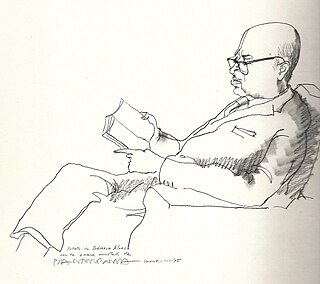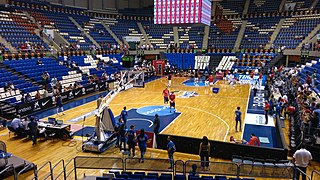
Vicente Montolíu Massana, better known as Tete Montoliu was a Spanish jazz pianist from Catalonia, Spain. Born blind, he learnt braille music at age seven. His styles varied from hard bop, through afro-Cuban, world fusion, to post bop. He recorded with Lionel Hampton in 1956 and played with saxophonist Roland Kirk in 1963. He also worked with leading American jazz musicians who toured in, or relocated to Europe including Kenny Dorham, Dexter Gordon, Ben Webster, Lucky Thompson, and Anthony Braxton. Tete Montoliu recorded two albums in the US, and recorded for Enja, SteepleChase Records, and Soul Note in Europe.

Dámaso Alonso y Fernández de las Redondas was a Spanish poet, philologist and literary critic. Though a member of the Generation of '27, his best-known work dates from the 1940s onwards.

Pabellón Insular Santiago Martín is an indoor arena that is located in San Cristóbal de La Laguna, Tenerife, Spain. It is primarily used for basketball games, and is the home arena of the Spanish professional basketball club, Iberostar Tenerife of the Liga ACB.

Mario C. Lugones was an Argentine film director. He directed films such as the 1950 film Abuso de confianza.

Beatriz Sarlo is an Argentine literary and cultural critic. She was also founding editor of the cultural journal Punto de Vista. She became an Order of Cultural Merit laureate in 2009.

The Boccherini Quintet was a string quintet founded in Rome in 1949 when two of its original members, Arturo Bonucci (cello) and Pina Carmirelli (violin), discovered and bought, in Paris, a complete collection of the first edition of Luigi Boccherini's 141 string quintets, and set about to promote this long neglected music. Since then, they performed all over Italy and Europe and in many parts of the world, including thirteen tours of North America.
Braulio Arenas was a Chilean poet and writer, founder of the surrealist Mandrágora group.
Gustavo Bueno Martínez was a Spanish philosopher, founder of a philosophical doctrine dubbed by himself as "philosophical materialism".

Arturo Aldunate Phillips (1902–1985) was a Chilean poet, civil engineer, mathematician, and researcher. He won the Chilean National Prize for Literature in 1976.

The Criminal Life of Archibaldo de la Cruz is a 1955 Mexican crime film by Spanish-born writer-director Luis Buñuel. It focuses on a would-be serial killer whose plans, although elaborate, never result in an actual murder.
Expropriative anarchism is the name given to a practice carried out by certain anarchist affinity groups in Argentina and Spain which involved theft, robbery, scams and counterfeiting currency. The robberies done were called "expropriations on the bourgeoisie". It had its major peak between 1920 and 1935 and some of its most famous practitioners were Buenaventura Durruti, Francisco Ascaso, Severino Di Giovanni, Miguel Arcángel Roscigna, and Lucio Urtubia. It was different from French illegalism because it was not thought of as a way of life but as a way of reaching political ends such as financing revolutionary activities, anarchist propaganda and the release of anarchist prisoners.
Spain participated in the Eurovision Song Contest 2011 with the song "Que me quiten lo bailao" written by Rafael Artesero. The song was performed by Lucía Pérez. The Spanish broadcaster Televisión Española (TVE) organised the national final Destino Eurovisión in order to select the Spanish entry for the 2011 contest in Düsseldorf, Germany. The national final consisted of two heats, a semi-final and a final and involved 24 competing acts. Three acts and nine songs ultimately qualified to compete in the televised final where an in-studio jury first selected one song per act to advance to the second round. In the second round of voting, a public televote exclusively selected "Que me quiten lo bailao" performed by Lucía Pérez as the winner.
Chono is a poorly attested extinct language of confusing classification. It is attested primarily from an 18th-century catechism, which is not translated into Spanish.
The Paraguay women's national handball team is the team that represents Paraguay in international handball competitions and is governed by the Federacion Paraguaya de Handball.

Huacramarca or Waqramarka is an archaeological site on a mountain of the same name in Peru. Huacramarca lies southeast of Contrahierbas, near the village Huallin. The ruins are situated on top of the mountain Huacramarca at an elevation of 4,150 metres (13,615 ft).
Antón Arrufat Mrad is a Cuban dramatist, novelist, short story writer, poet and essayist.
Lupe Rumazo Cobo is an Ecuadorian writer. She is the author of 11 books of essays, short stories and novels.
Salesiano Valparaíso is a primary and secondary Salesian school. It is located in Valparaíso, Chile.

Abdala, technical name CIGB-66, is a COVID-19 vaccine developed by the Center for Genetic Engineering and Biotechnology in Cuba. This candidate, named after a patriotic drama by Cuban independence hero José Martí, is a protein subunit vaccine containing COVID-derived proteins that trigger an immune response. The full results of the clinical trial have not yet been published. This candidate followed a previous one called CIGB-669 (MAMBISA).

The Center for Genetic Engineering and Biotechnology is a research institute in Havana, Cuba. It is responsible for creating the Abdala vaccine.










